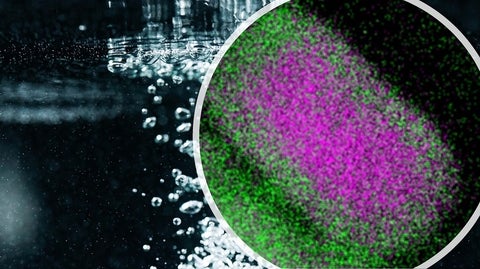
Theme Overview
Sustainable reaction engineering focuses on designing and optimizing industrially relevant chemical reactions to minimize environmental harm and promote sustainability. Researchers focus on CO2 capture and conversion into valuable chemicals and renewable fuels. Sustainable reaction engineering develops processes that reduce energy consumption and waste production. By optimizing catalysts and reaction conditions, developing novel reactor designs, improving models of reaction kinetics and integrating reaction and separation systems, researchers find innovative solutions to advance sustainability in the chemical industry.
Professor Eric Croiset
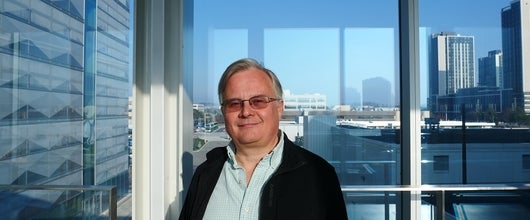
Professor Eric Croiset is interested in CO2 capture technologies. Historically his research group has focused on localized large point captures of CO2, for example from industrial smokestacks or powerplants. He is currently pivoting to technology to capture C02 directly from the air called Direct Air Capture (DAC). It captures minute amounts of CO2 from the air. He is doing techno-economic assessments and process modelling to assess the effectiveness of this process. This is research into CO2 capture supported by Environment Canada Climate Change Canada.
Croiset is also investigating the development of an advanced solvent to capture CO2 with Professor Milad Kamkar. Additionally, his research group in collaboration with Professor Peter Douglas professors from Strathclyde University in Scotland on a project that advances research on decarbonizing the steel industry. Data will be gathered on existing industrial processes and assess adaptation requirements to implement a hydrogen solution.
Professor Michael Fowler
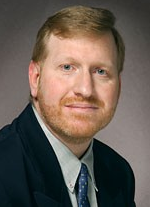
Professor Michael Fowler's research, through a series of publications, has advanced the concept of a “Hydrogen Economy” with hydrogen and ammonia energy storage, and hydrogen ‘vectors’ as critical components of micro-energy hubs. In his “Power to Gas” (PtG, PtX) energy storage and distribution concept he uses natural gas and electrical distribution systems. Fowler, Canada Research Chair – Zero-Emissions Vehicles and Hydrogen Energy Systems is the Director of the University of Waterloo Green Energy and Fuel Cell Research Group.
Professor Ivan Gogolev
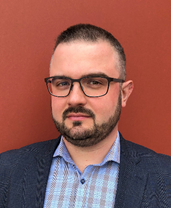
Professor Ivan Gogolev's research focuses on exploring thermochemical conversion phenomena relevant to the development and commercialization of scalable technologies aimed at decarbonizing the industrial sector. Such technologies include thermochemical recycling of plastic wastes, carbon capture through chemical looping combustion and gasification, as well as industrial electrification of high temperature processes.
Professor Luis Ricardez-Sandoval
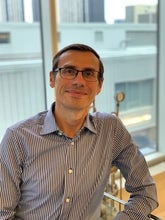
Professor Luis Ricardez-Sandoval is a Canada Research Chair in Process Systems Engineering and Multiscale Modelling and leads the Chemical process Optimization, Multiscale Modelling and Process Systems Research Group at the University of Waterloo. His research focus on the development of novel state-of-the-art computational and theoretical tools and algorithms that can aid in the design of novel environmentally-friendly materials, or improve the efficiency and sustainability of chemical and manufacturing systems.
A central topic in Luis research is centered on global warming and aims to developing new materials and processes that can effectively capture the CO2 emissions coming from stationary sources, e.g., power plants. Luis is particularly interested in using chemical looping technology as a means to generate power (e.g., heat) and capture the CO2 emissions coming from the combustion of this process. Moreover, we investigate how renewable sources such as biomass could be used to capture CO2 or being directly transformed into basic chemical materials that are widely used in the industry to produce added-value products to society, e.g., the fuels used as a means of transportation.
In collaboration with a major financial institution and faculties from Computer Science and Combinatorics an Optimization, Luis is currently leading a project on ways to accelerate the design of novel materials (e.g., catalysts) that can effectively transform CO2 into valuable chemicals (e.g., carbon monoxide- a key material used to produce a wide variety of products) using state-of-the-art computational methods such as machine learning (ML) and Bayesian Optimization.
Watch Professor Ricardez-Sandoval's research interest video.
Professor David Simakov
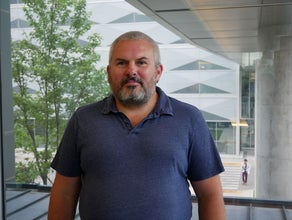
Professor David Simakov’s research focuses on the conversion of CO2 into renewable synthetic fuels. The main aim is to develop processes for utilization of CO2 emissions from various sources (e.g., steel and cement industry, power plants, landfill gas) by reacting it with renewable hydrogen. Renewable hydrogen is generated by water splitting using renewable power such as wind, solar and hydro. Simakov’s research group develops catalysts, reactors, and systems to make CO2 utilization processes economically viable.
A challenge to widespread utilization of renewable hydrogen is the lack of infrastructure for hydrogen storage and transportation. The existing infrastructure, which is currently being used for fossil fuels, can be utilized for storage and transportation of renewable synthetic fuels made from CO2. By reacting CO2 with renewable hydrogen, it is possible to make renewable natural gas, methanol, jet fuel, and many other sustainable fuels, even including renewable gasoline.